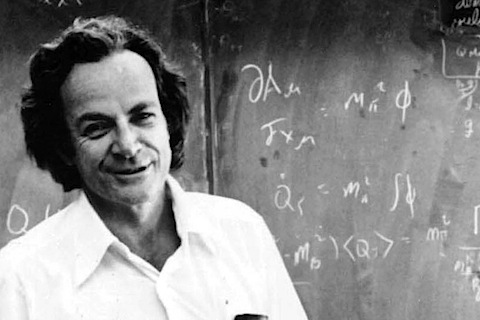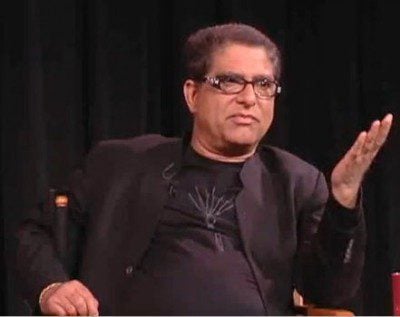
“If
you think you understand quantum mechanics, you don't understand
quantum mechanics.”
Richard
Feynman
If
you were to ask a Quantum Physicist who they would really, really,
really
like to smack around if they had the chance, they'd probably look at
you funny and say "No one". Physicists tend to be nice
like that. But, if you were to ask them who has contributed most to the general public's confusion regarding Quantum Physics,
the answer you'll most likely hear is “Deepak F**ing Chopra”
(being nice does not preclude occasional swearing).
Deepak Chopra is a one-man ‘woo-woo’ factory. He
has, these past few decades, made a career out of mangling intricate
scientific concepts and repackaging them in gaudy, new-age garb. The
method is simple. Lift a technical term from the field of Quantum
Mechanics , explain it in a manner that is either grossly
over-simplified or flat out wrong and then crowbar it into a
hodge-podge construction of Eastern mysticism and pseudo-scientific
gobbledygook.
In order to best demonstrate just how wrong Chopra can
be, it is neccessary to give a quick introduction to some of the
terms he uses and what they actually mean. For instance, the Wave
Function of a particle represents all of its potential states and
locations within a certain timeframe. For the purposes of brevity we
shall focus purely on how Wave Function pertains to position.
Consider the following hypothetical scenario.
Imagine a long, empty corridor with a door at each end,
we shall call them Door A and Door B. An invisble man enters through
Door A (yes an invisble man, its a hypothetical situation people. If
I wanted it could have been an invisible, unicorn-riding velociraptor
with a pipe and a smoking jacket, let it go). As the invisble man
makes his way from Door A to Door B we consider the corridor to
represent his Wave Function. The space inside the corridor contains
every possible position he may occupy and every possible path he may
take from one door to the other. As long as the corridor remains
closed we have no way to ascertain the exact position of our
invisible guest.
So, in order to discover where he might be, we begin
letting people walk in the opposite direction from Door B towards
Door A. The moment one of these people bump into our mysterious
visitor, his position becomes certain. At the moment of interaction
he is no longer potentially occupying a range of space but is
definitively occupying a single spot within the corridor. Similarly,
physicists seeking to collapse the Wave Function of a particle into a
point can do so by introducing additional particles with which it can
interact. As a collision takes place its position can be noted and
mapped to that specific location.
Now
it must be clear, consiousness does not enter into this scenario in
the real world. The wave function of a photon from the sun is just
as easily collapsed by a rock in the Martian desert as it is by a
human eye on Earth. The key here is interaction. Physicists have
used the term observation because, well, they were describing what
had been observed about
these interactions. Chopra however cuts out interaction entirely and
makes conscious
observation
the be all and end all of the matter. Consider the ludicrous
implications of the following statement from Chopra;
"If we do not look at it, the moon is gone. In this
world, only an act of observation can confer shape and form to
reality — to a dandelion in a meadow, or a seed pod, or the sun or
wind or rain. Anyway, it’s amazing, and even your dog can do it
too."
That's right, if nobody is looking at the moon, in
Deepak Chopra's world, that means it ceases to exist. But hang on a minute. If the moon
requires observation to exist, how did it form in the first place?
Where would it go if we all blinked simultaneously? If it did pop
out of existence what force would bring it back when we opened our
eyes? While we're on the subject, I can't see the hair on my head
without the aid of a mirror. Does this mean that when I'm alone I
become bald? And what happens when someone joins me? Does my hair
grow out really, really fast or does it simply pop back into
existence? And why the blooming heck does it always come back
ginger? Oh, that's right, because it is always ginger and it is
always there, whether someone is looking at it or not.
My
hair is not a particle and neither is the damned Moon. The moon is a
colossal structure made up of billions upon billions of particles
that are constantly interacting with each other. The Moon, as well
as every other astronomical object for that matter, existed for
billions of years prior to the evolution of entitities capable of
observing them. The stars of distant glaxies were fusing hydrogen
into helium just fine before we invented the high powered telescopes
needed to view the process.
Debunking
this Quantum Quackery requires no experiment or complex mathematics.
A few moments to consider the implications of this model of reality
generates sufficient cause to toss it aside. But, this man has been
repeating his nonsense for years, both in books and on the public
speaking circuit. I see only three possible reasons for him to
continue to endorse nonsense that is so easily falsified.
- He is relying on his audience's ignorance of a notoriously difficult scientific field.
- He actually believes what he says and is , himself, completely ignorant on the subject.
- All of the above.
Another
significant factor of Chopra's success is that there seems to be an
unending line of credulous celebrities ready to credit him as their
spiritual guru. From his longtime association with Michael Jackson
to the gushing praise of Mike Myers, Deepak Chopra maintains a
constant spot in the limelight. One which he continuously uses to
push his vacuous, easily digested non-science on a celebrity obsessed
population. These endorsements serve to grant him an air of
authority in the public sphere, one which he would never have been
able to earn based on merit alone.

He is the classic charlatan who relies on the credulity of the public and especially the rich and gullible.
ReplyDeleteHaving read a number of his articles and watched a few of his debates, I would bet D-bag Chopra would respond to your argument with something about "the universal consciousness" and how there is a greater entity (god) that keeps all of these things in reality by being the ultimate observer.
ReplyDeleteSO your points are great and make sense, but only to someone who is not under the presupposition or delusion that there is a god. To everyone else, you just "don't get it, man". But unfortunately, I don't think that they "get it", and neither does Chopra, or he does and is a greedy cock.
This comment has been removed by the author.
ReplyDelete